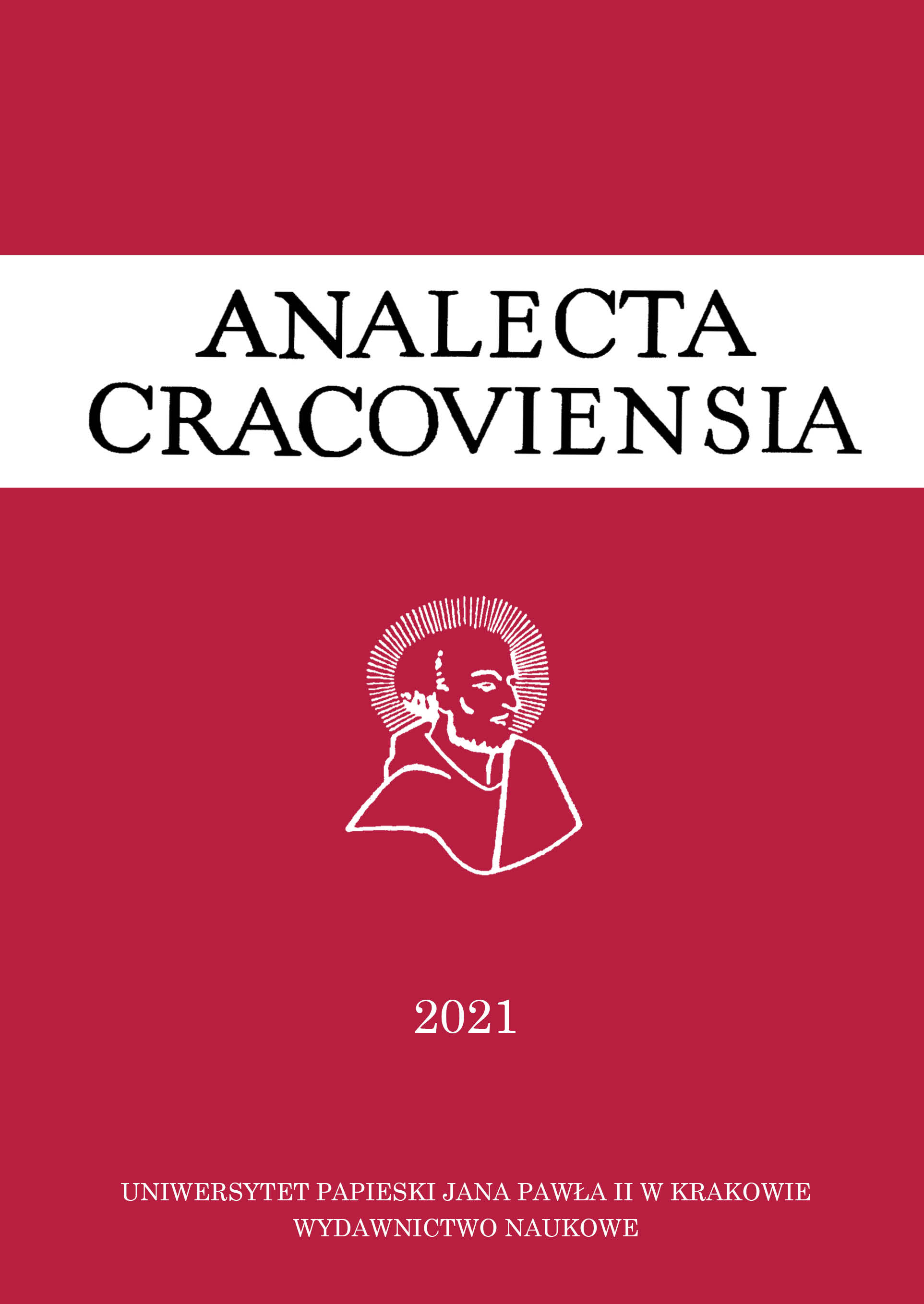Etyka seksualna, małżeństwo i rodzina jako zniewolenie czy ostoja prawdziwej wolności? Analiza obrony małżeństwa i rodziny w pismach Gilberta Keitha Chestertona
DOI:
https://doi.org/10.15633/acr.5303Słowa kluczowe:
Chesterton, rewolucja kulturowa, małżeństwo, rodzina, etyka seksualnaAbstrakt
Rewolucja kulturowa postępuje przez dzieje, niosąc wyzwolenie uciemiężonemu człowiekowi. Po oswobodzeniu go z ucisku klasy społecznej głosi ona wyzwolenie ze sztywnych norm kulturowych, etyki seksualnej, nierozerwalnego małżeństwa, trudności, jakie powoduje posiadanie rodziny, a nawet uwolnienie człowieka z okowów własnej, określonej płci. Czy jednak rzeczywiście jest to wyzwolenie? Zdaniem Gilberta Keitha Chestertona, który był świadkiem początków przemian społecznych, jakie następowały już na przełomie XIX i XX wieku, rewolucja obyczajowa może prowadzić do bardziej wyrafinowanej formy zniewolenia – zniewolenia umysłu. Artykuł przedstawia obronę etyki seksualnej, małżeństwa i rodziny proponowaną przez Chestertona, starając się odpowiedzieć na pytania, czy głos tego pisarza może być aktualny i intrygujący również współcześnie oraz czy może on ubogacić obecne spory nowym punktem widzenia.
W odniesieniu do potrzeby wyzwalania się od norm pisarz odwraca perspektywę, ukazując, iż to nie katolicka etyka seksualna, nierozerwalność małżeństwa i rodzina są okowami zniewalającymi człowieka, lecz ciągłe zmiany, swoboda seksualna oraz rozwody – to one prowadzą bowiem do osłabienia ludzkiej woli i intelektualnego zniewolenia. Prawdziwa wolność ukryta jest natomiast, w sposób nieoczywisty i paradoksalny, właśnie w przestrzeganiu etyki seksualnej, trwałym małżeństwie i rodzinie, które nie tylko stanowią chrześcijańskie ideały, ale są wyjątkowo racjonalne.
Bibliografia
Bloom A., Umysł zamknięty, przeł. T. Bieroń, Poznań 1997.
Chesterton G.K., Co jest złe w świecie, tł. M. Reda, Sandomierz 2013.
Chesterton G.K., Czterech niewinnych złoczyńców, tł. M. Reda, Sandomierz 2014.
Chesterton G.K., Dla sprawy, tł. J. Rydzewska, Warszawa 2014.
Chesterton G.K., Eugenika inne zło, tł. M. Reda, Sandomierz 2012.
Chesterton G.K., Heretycy, tł. J. Rydzewska, Warszawa-Ząbki 2004.
Chesterton G.K., Obrona człowieka. Wybór publicystyki (1909–1920), tł. J. Rydzewska, Warszawa 2008.
Chesterton G.K., Obrona rozumu. Wybór publicystyki (1930–1936 oraz wydania późniejsze), tł. J. Rydzewska, Warszawa 2014.
Chesterton G.K., Obrona świata. Wybór publicystyki (1901–1908), tł. J. Rydzewska, Warszawa 2006.
Chesterton G.K., Ortodoksja. Romanca o wierze, tł. M. Sobolewska, Warszawa-Ząbki 2008.
Chesterton G.K., Zabobon rozwodu, tł. M. Reda, Sandomierz 2012.
Chesterton G.K., Źródło i mielizny, tł. J. Rydzewska, Warszawa 2016.
Gałuszka P., Karol Wojtyła i „Humanae vitae”. Wkład arcybiskupa krakowskiego i grupy polskich teologów w encyklikę Pawła VI, tł. z oryginału włoskiego K. Stopa, Warszawa 2018.
Dostojewski F., Dzieła wybrane, t. 6: Bracia Karamazow, tł. A. Wat, Warszawa 1959.
Freud Z., Wstęp do psychoanalizy, tł. S. Kempnerówna, W. Zaniewicki, Warszawa 1957.
Hylewski M., Burdzik T., Teoria krytyczna Szkoły Frankfurckiej jako krytyka kultury masowej, „Kultura – Historia – Globalizacja” (2014) nr 15, s. 115–137.
Kuby G., Globalna rewolucja seksualna. Likwidacja wolności w imię wolności, tł. D. Jankowska, J. Serafin CSsR, Kraków 2013.
Kupczak J., Amoris laetitia. Konflikt interpretacji, Poznań 2020. Kupczak J., Źródła sporu o „Amoris laetitia”, Poznań 2018.
Laskowska E., Przywrócić wolność intelektualną w „epoce nonsensu”. Analiza myśli G.K. Chestertona, „Studia Nauk Teologicznych” 15 (2020), s. 245–262.
Łysień L., Groza pandemii, Kraków 2021.
Miłosz C., Zniewolony umysł, Paryż 1980.
Orwell G., 1984, Kraków 1981.
Peeters M.A., Globalizacja zachodniej rewolucji kulturowej. Kluczowe pojęcia, mechanizm działania, tł. G. Grygiel, Warszawa 2010.
Petry-Mroczkowska J., Amerykańska wojna kultur, Warszawa 1999.
Pobrania
Opublikowane
Numer
Dział
Licencja
Prawa autorskie (c) 2022 Ewa Laskowska

Utwór dostępny jest na licencji Creative Commons Uznanie autorstwa 4.0 Międzynarodowe.
Obecnie autorzy publikujący w czasopiśmie udzielają jego wydawcy zgody o następującej treści:
- Autor zachowuje autorskie prawa majątkowe do utworu, a jednocześnie udziela wydawcy czasopisma zgody na jego pierwszą publikację w wersji drukowanej i wersji online na licencji Creative Commons Uznanie autorstwa 4.0 Międzynarodowe oraz zgody na wykonywanie opracowań, w tym przekładów.
- Autor ma możliwość udzielania zgody niewyłącznej na opublikowanie utworu w wersji, która ukazała się w czasopiśmie (np. zamieszczenia go w repozytorium instytucjonalnym lub opublikowania w książce), wraz z informacją o jego pierwszej publikacji w czasopiśmie.
- Autor może umieścić swój utwór online (np. w repozytorium instytucjonalnym lub na swojej stronie internetowej) jeszcze przed zgłoszeniem utworu do czasopisma.

